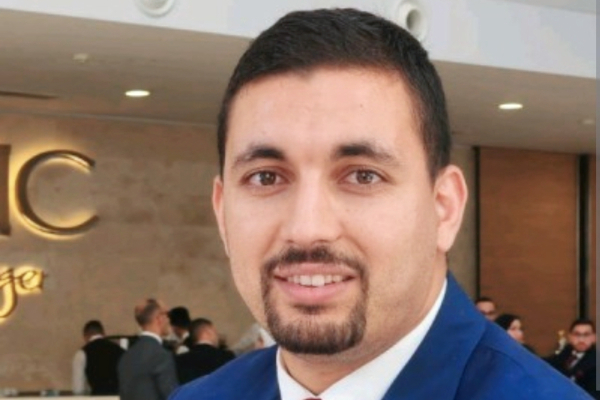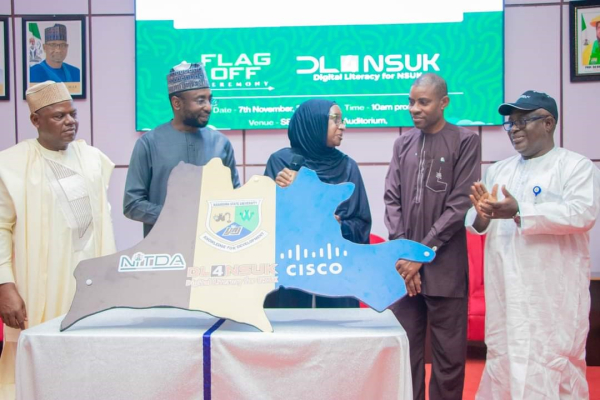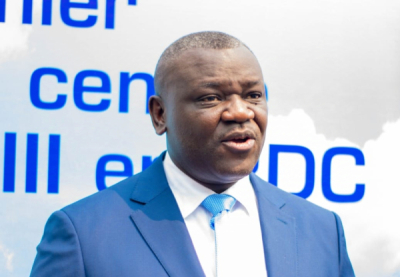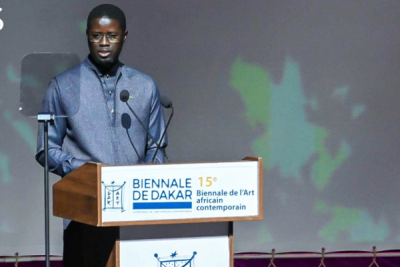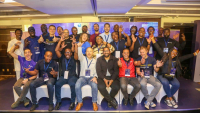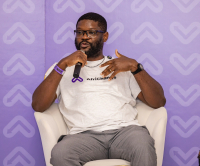He harnesses technology to address unmet needs in Algeria. He leads two companies, one of which connects individuals to local and international experts.
Kheireddine Boulefa (photo), an Algerian tech entrepreneur, is the founder and CEO of Moustachir, an online consulting platform that connects users with Algerian experts across various fields, both nationally and internationally.
Founded in 2022, Moustachir enables users to engage with high-level Algerian specialists across diverse sectors, including economics, finance, entrepreneurship, and import-export. The platform also offers technical consulting in web and app development, artificial intelligence, networking, cybersecurity, operating systems, data analysis, and robotics.
In addition, Moustachir provides consultations in social, educational, linguistic, artistic, and media fields. With over 90 consultants, the platform extends services such as business domiciliation, training programs, and coworking space rentals.
Beyond Moustachir, Boulefa is also the CEO of Yinvesti, an Algerian crowdfunding platform that connects entrepreneurs and investors. Prior to founding Moustachir, he launched EURL KHEIROTAXI, a chauffeur-driven vehicle reservation platform, which he led until 2022.
Before his entrepreneurial ventures, Boulefa worked with Oriflame SPO, a beauty products company, joining in 2013 as an agency director in Algeria. In 2017, he became a project manager at BlueGreen Business, a startup incubator, a role he held until 2022.
Melchior Koba
Africa’s shift toward a digital economy faces a critical skills gap, largely due to insufficient training systems that fail to meet current demands. Addressing this challenge swiftly is essential to enable Africans to fully engage in the global economy and remain competitive.
Nasarawa State University, Keffi (NSUK) has launched the Digital Learning for NSUK (DL4NSUK) initiative in partnership with the National Information Technology Development Agency (NITDA) and US technology company Cisco. The event, held on 7 November 2024 at the School of Postgraduate Studies' SB Mohammed Auditorium, makes NSUK the first Nigerian university to participate in this digital literacy program.
In his speech, the Director General of NITDA, Kashifu Inuwa Abdullahi, stressed the importance of digital literacy, aligning the program with the Federal Government's National Digital Literacy Framework under the administration of President Bola Ahmed Tinubu.
The government has set itself the ambition of achieving a digital literacy rate of 60% among young people and adults by 2025 and a national digital literacy rate of 95% by 2030, he said. He also stressed the need to prepare students with digital skills in view of the new know-how requirements of the job market between now and 2030. Kashifu Inuwa Abdullahi expressed NITDA's commitment to developing the digital skills of Nigerians through higher education, making NSUK an exemplary partner in this inaugural initiative.
These efforts are linked to the government's goal of developing the country's digital economy, which contributed 13.12% to total nominal GDP in the first quarter of 2024, according to the National Bureau of Statistics. Enhancing the digital skills of the population is essential to support this growth.
Professor Sa'adatu Hassan Liman, Vice-Chancellor of NSUK, emphasized that the aim of the program was to make the university a regional leader in ICT, artificial intelligence, and robotics. She stressed that integrating cutting-edge technologies into NSUK's curriculum would enable students to acquire essential skills, such as problem-solving and innovative thinking, that are vital in the digital age.
Hikmatu Bilali
Digital cooperation is crucial for driving technological advancement and economic growth. It allows countries to work together to address digital challenges and spur innovation.
The Democratic Republic of Congo’s (DRC) Minister of Posts, Telecommunications, and Digital Affairs, Augustin Kibassa Maliba, is currently on an official visit to Warsaw, Poland, to strengthen digital cooperation between the two countries. This visit, which began on Thursday, November 7, seeks to finalize agreements on key projects aimed at advancing the DRC’s digital development.
According to a statement from the DRC’s ICT Ministry, the agreements will promote cooperation across key digital segments, including infrastructure modernization through the development of high-speed networks and data centers to improve connectivity. Cybersecurity is also a focal area, with initiatives designed to enhance defenses against cyberattacks.
Another priority is supporting e-government by digitizing public services to improve their efficiency and accessibility for citizens. Additionally, the agreements include plans to establish ICT training centers, aimed at developing young talent in the digital sector and stimulating innovation, especially by supporting tech startups.
This initiative is part of the “Horizon 2025” National Digital Plan, launched to drive the DRC’s digital transformation goals. It follows a recent meeting between Congolese President Félix Tshisekedi and Polish President Andrzej Duda on the sidelines of the 79th session of the United Nations General Assembly in New York in September. The two leaders announced plans for future partnerships in digital transformation and defense.
As part of this collaboration, Poland will contribute its expertise, particularly in connectivity infrastructure. With an ultra-high-capacity network covering 81.1% of households, Poland is a leader in fiber optic technology—a model the DRC aims to emulate to reach its own connectivity targets by 2050. Leveraging Polish expertise, the DRC aims to achieve over 50% fiber optic coverage and connect more than 90% of its population to the mobile network by 2050, facilitating comprehensive digital transformation and inclusive economic growth.
Samira Njoya
He is committed to empowering African youth by providing them with the tools and guidance needed to reach their full potential. Through technology, he has already managed to reach thousands of young people across the continent.
Patrick Ngounou (photo) is the founder and CEO of Student’s Mag, a startup aimed at improving access to education and employment in Africa. A Cameroonian-born, Ngounou envisions making his company an essential partner for African students.
In 2008, Student’s Mag began as a 152-page directory listing training programs available in Cameroon. As demand from parents for educational information grew, Ngounou and his team realized the need for a more sustainable solution. This led to the official launch of the startup Student’s Mag in 2023.
Today, leveraging technology, Student’s Mag connects talent, experts, academic institutions, and businesses across Africa. The platform democratizes access to information and supports young people in their educational and professional journeys. It offers a comprehensive range of school and career guidance services tailored to the needs of African students, helping them make informed choices about their studies and easing their transition into the job market.
Young users can access digital directories of universities, an AI-driven job portal, and scholarship opportunities at partner institutions. Universities, training centers, and companies can also promote themselves through the platform.
"Since our launch, more than 2,000 students have already benefited from our services, finding valuable guidance and resources for their academic and professional paths. This direct impact on the lives of young Africans is the greatest reward for our work," Ngounou told We Are Tech Africa. The startup has already reached over 4,000 young people and lists 1,400 institutions across Cameroon, Côte d'Ivoire, Senegal, Gabon, and Togo.
Ngounou also has extensive experience in international mobility and entrepreneurship. In 2006, after three years as a junior consultant in international mobility, he founded Advisers Agency, a firm that helps African students pursue studies abroad. In 2012, he expanded his business ventures by launching Advisers Services Sarl, a freight transportation company that has worked with major clients like Guinness, Bolloré, and Fobert Centrafrique.
After completing his baccalaureate, Ngounou studied mathematics for a year at the University of Yaoundé 1. In 2003, he enrolled at Cambridge International College, earning an advanced diploma in finance in 2006. He is currently pursuing a Global International MBA in impact entrepreneurship at the Catholic University of Milan.
An active member of the Junior Chamber International (JCI), Ngounou recently won third place in the 2024 Orange Social Venture Prize for Africa and the Middle East (POESAM) in Cameroon.
Melchior Koba
He has over 10 years of experience in industrial operations and digital transformation projects. He leads a startup that leverages technology to revolutionize the agricultural sector.
Amine Derj (photo) is a Moroccan tech entrepreneur, co-founder and CEO of Jodoor, an agri-tech startup. Founded in 2021, Jodoor aims to provide Africa and the Middle East with a robust, inclusive, and sustainable agricultural infrastructure to meet the needs of tomorrow's agriculture.
The company offers “turnkey” soil-free farms in Morocco and across the Maghreb region, using technology that reduces water consumption by 80% and enables pesticide-free production, promoting environmentally friendly farming practices. Jodoor supports farmers with sustainable solutions, encourages female inclusion, and also develops agricultural management software and offers technical consulting services.
In addition to Jodoor, Derj is the co-founder and corporate relations lead for the EDHEC Social Impact and Innovation Club, an organization launched in 2018 to advance social impact through innovation. The club collaborates with social organizations to accelerate projects with high social and environmental value.
Derj holds a degree in industrial engineering from the National Institute of Applied Sciences, Centre Val de Loire, obtained in 2013. In 2014, he earned a master’s in project and program management from SKEMA Business School and later, in 2019, completed an MBA at EDHEC Business School in France.
To build his expertise, Derj joined the mobility company Iveco in 2013 as an industrial project engineer. In 2014, he moved to TE Connectivity, where he served as a supply chain analyst for Europe, the Middle East, and Africa. From 2021 to 2024, he was head of digital transformation at Infomineo, a firm specializing in outsourcing services such as research, analysis, design, and language support.
Melchior Koba
Digital technologies offer an innovative approach to preserving cultural heritage and traditions. Across Africa, countries are harnessing these tools to increase the visibility of their heritage and drive economic growth.
The integration of digital technologies in the preservation and promotion of intangible heritage presents significant opportunities for Senegal, according to Senegalese President Bassirou Diomaye Faye. During the opening ceremony of the 15th Dakar Biennale of Contemporary African Art on Thursday, November 7, he urged cultural stakeholders to utilize digital tools to enrich and disseminate the country’s cultural heritage globally.
"Digital technologies have transformed the cultural value chain, making the cultural economy increasingly digital. Digitalization offers an opportunity to enhance our rich intangible heritage. The national cultural sector must seize and harness the considerable potential offered by digitalization," President Faye stated.
This call to action aligns with the mission of the Biennale—a prominent event that, beyond its artistic focus, aims to place culture at the center of contemporary issues. It also reflects the recommendations from UNESCO's 2018 report, Re-thinking Cultural Policies: Placing Creativity at the Heart of Development, which underscores the transformation of the cultural value chain and highlights the central role of digital technology in the evolving cultural economy.
The implications of this vision for Senegal are substantial. By fully embracing digital technologies, the country could not only preserve and promote its intangible cultural heritage but also enhance its creative economy, generating new job opportunities for youth and women. Digital transformation will facilitate better management of cultural data, archiving, and access to works, paving the way for a redefined role for Senegal on the global cultural stage.
Samira Njoya
As more Africans connect online, concerns about the inadequate protection of personal information are fueling a growing focus on data privacy and regulatory control in digital communications. This shift reflects broader global efforts to strengthen data protection in online spaces.
Zimbabwe’s Minister of ICT, Postal, and Courier Services, Tatenda Mavetera, announced new regulations mandating that all WhatsApp group administrators register and obtain a license from the Post and Telecommunications Regulatory Authority of Zimbabwe (POTRAZ). The announcement was made at the POTRAZ breakfast meeting on Wednesday, November 6.
This licensing, which starts at a minimum fee of $50, will apply to various groups, including businesses, community organizations, and churches. Non-compliance could result in penalties, and POTRAZ advises groups to seek guidance on fulfilling the new obligations.
Minister Mavetera emphasized the new requirements as essential for enhancing data privacy and security, impacting any group that collects personal information. "Even churches who collect personal data ought to have such a license and appoint a Data Protection Officer (DPO)," she explained, underlining the government’s intent to strengthen data security for all citizens.
Zimbabwe enacted the Data Protection Act in 2021 to safeguard personal data and regulate its handling across all digital platforms. With WhatsApp groups commonly used for communication, government entities argue that requiring licenses for group admins and Data Protection Officers aligns with the Act’s mandate to protect personal information from potential misuse.
The Postal & Telecommunications Sector Abridged Performance Report for Q2 2024 reveals that mobile internet and data traffic in Zimbabwe increased by 12.5%, climbing from 58.44 petabytes in Q1 2024 to 65.75 petabytes in Q2. This rise likely reflects consumers' growing reliance on mobile data for internet access, with social media being a major contributor to this consumption.
Alongside the license, group admins must appoint a certified DPO, a role mandated by Zimbabwe’s Data Protection Act. The Act defines personal data as any information that can identify a person, and the government asserts that group admins, having access to members' phone numbers, need to protect such data accordingly.
Hikmatu Bilali
Visa has announced investments in four African fintech startups from its Visa Africa Fintech Accelerator, underscoring its commitment to financial inclusion and Africa’s digital ecosystem.
The investments focus on startups addressing Africa’s unique challenges including: Workpay, a Kenyan HR and payroll platform operating across 35 countries; Oze, a Ghana-based digital platform providing SMEs with record-keeping tools and an ML-powered credit scoring system; OkHi from Nigeria, a smart addressing solution to verify and locate physical addresses; and ORDA, a Nigerian restaurant management software supporting over 1,500 restaurants with inventory and order processing tools.
The Central Bank of Nigeria (CBN) has awarded Currenzo, a Nigerian subsidiary of global financial platform Africhange, an International Money Transfer Operator (IMTO) license. This license allows Currenzo to process remittances directly into Nigeria without intermediaries, offering faster and more affordable transfers for Nigerians locally and abroad.
With this approval, Currenzo can now partner directly with Nigerian banks to streamline payments and reduce costs. The company has already partnered with three Nigerian banks and is actively seeking a settlement partner to secure transactions.
By using blockchain technology, Africhange aims to offer low-cost, efficient cross-border transfers, particularly for the African diaspora.
Africa’s digital landscape is poised for continued expansion, with a focus on improving digital access across both urban and rural regions. Maintaining favorable regulations and addressing infrastructure constraints will be essential to sustaining this momentum.
Starlink has paused new subscriptions in Nairobi and five nearby counties due to overwhelming demand that has stretched the network's capacity. On November 4, CEO Elon Musk addressed the issue, stating that Starlink is actively working to expand internet capacity in densely populated urban areas.
Starlink is working to increase Internet capacity in dense urban areas in Africa as fast as possible.
— Elon Musk (@elonmusk) November 4, 2024
Please note that there is still significant capacity outside of city centers. https://t.co/Vlk4sNDAjX
The communications Authority of Kenya reveals in its Fourth Quarter Sector Statistics Report For The Financial Year 2023/2024 that Satellite subscriptions recorded a significant growth, from 405 in June 2023 to 8,324 in June 2024, an annual growth rate of 1,955.3%. This growth is attributed to the licensing and subsequent launch of Starlink Internet Services Kenya earlier in the financial year, laying the foundation for digital services to reach even remote regions.
Starlink provides high-speed, low-latency broadband using Low Earth Orbit (LEO) satellites, offering speeds of up to 200 Mbps. Initially, Starlink offered a 100 Mbps plan at KES 6,500 ($50), while leading telco Safaricom provided the same speed in its Diamond plan at KES 12,499 ($97). However, in response to competition, Safaricom upgraded its Diamond package in September 2024, maintaining the same price but increasing the speed to 500 Mbps.
Since its launch in Kenya in July 2023, Starlink has risen to capture 0.5% of the market share with 8,063 subscribers, according to the Communications Authority. This growth was fueled by discounted kits and affordable monthly plans. To attract budget-conscious customers, Starlink introduced a KES 1,950 ($15) monthly rental plan for its hardware in August this year, which otherwise costs KES 45,000 ($349) to purchase.
This situation serves as a valuable case for broader discussions on internet infrastructure in Africa, where underserved regions often struggle with high costs and inconsistent service from traditional ISPs. Starlink's entry into the market has been a disruptive force, offering an alternative with competitive pricing and reaching areas previously underserved by terrestrial networks.
Hikmatu Bilali
More...
Since the beginning of the year, investment vehicles have been forming across the continent to fund the startup ecosystem. Several companies have joined forces to launch a new initiative in this direction.
Mara Group, a conglomerate founded by British entrepreneur Ashish Thakkar, has announced the creation of a $250 million investment vehicle to support African startups. The agreement was signed on the sidelines of the 2024 Future Investment Initiative, held last week in Riyadh, Saudi Arabia.
Mara Group has partnered with Startupbootcamp, a technology accelerator, and India-based investment firm Blend Financial Services to execute this project. The new fund will target growth-stage startups and pre-IPO financing, with a focus on South Africa, Nigeria, Kenya, Côte d'Ivoire, and Egypt.
Besides Côte d'Ivoire, the other four target countries represent Africa’s most attractive startup ecosystems in terms of funding. According to Partech Africa data, startups in the "Big Four"—South Africa, Nigeria, Kenya, and Egypt—drew nearly 79% of the continent’s total venture capital funding in 2023, amounting to $1.79 billion. In 2022, these countries captured 72% of funding, totaling $3.5 billion. Startups in Côte d'Ivoire raised $33 million in 2022 and $21 million in 2023, making it the only Francophone country included in the initiative.
This move comes amid a tightening of capital in Africa’s tech ecosystem since 2023, a year marked by a sharp decline in startup fundraising. According to Africa: The Big Deal, African startups have raised $1.7 billion so far this year, a 32% drop from the same period in 2023.
Adoni Conrad Quenum
Egypt’s startup ecosystem is set for growth, driven by rising investor interest, government-led digital transformation, and a growing talent pool. By tackling funding and regulatory challenges, Egypt is on course to become a major tech hub in Africa and the MENA region, boosting economic diversification and digital innovation.
The Minister of Communications and Information Technology, Amr Talaat, attended the launch of "Invest IT," an innovative program to enhance investment readiness for tech startups. The program was organized on November 4, in a collaborative effort between the Technology Innovation and Entrepreneurship Center (TIEC), part of the Information Technology Industry Development Agency (ITIDA), and Flat6Labs, a leading venture capital firm in the MENA region.
Minister Talaat reaffirmed the government’s dedication to creating a conducive environment for startups and entrepreneurs. He outlined several ongoing initiatives focused on skill development, attracting international incubators, facilitating investor access, and establishing Creativa Innovation Hubs across Egypt to nurture innovative talent.
In addition, Talaat emphasized efforts to streamline startup registration processes, enhance post-establishment support, and invest in digital infrastructure to enable startups to thrive.
Ahmed Elzaher, CEO of ITIDA, expressed excitement over partnering with Flat6Labs, highlighting the agency's commitment to supporting startups from ideation to scaling internationally.
Egypt's startup ecosystem is a top performer in the MENA region, ranking third in attracting venture funding. In 2023, Egyptian startups secured $503 million in funding, a decline from the $810 million raised in 2022, according to Lucidity Insights.
The drop in funding for Egypt's startup ecosystem in 2023 highlights potential challenges in sustaining investment momentum amid shifting economic conditions. While Egypt remains a leading startup hub in the MENA region, the decline may indicate heightened caution from investors due to global economic uncertainties, regional competition, or evolving funding priorities. This shift emphasizes the need for robust support mechanisms, like government-backed programs and strategic partnerships, to help startups weather funding fluctuations.
Invest IT is designed to support ICT-enabled startups at the seed and pre-series A stages across Egypt’s governorates. The program aims to equip startups with the skills and resources needed to secure investment deals, providing a structured path to help them navigate the complexities of funding and growth.
The program will run over six to eight weeks, supporting 12 startups as they develop investment strategies and refine their pitches to investors. Upon completion, participants will have opportunities to connect with potential investors, with ongoing support from the program team.
With this support, Invest IT is poised to accelerate the growth of Egyptian tech startups by fostering a robust ecosystem that prepares them for sustainable growth and successful investment outcomes.
Hikmatu Bilali
As cities continue to grow at a rapid pace, smart mobility solutions are emerging as crucial tools to improve traffic safety and efficiency. These interconnected systems optimize road networks and help address the challenges posed by urbanization.
Dakar’s roadways are set to receive a smart, connected transportation system developed by Huawei, as part of a partnership between Senegal and China. The innovative system was presented on Wednesday, November 6, by the Chinese tech firm to members of the Senegalese government.
“This nationwide project, with a significant digital component, exemplifies the need for coordinated digital initiatives by the State of Senegal. This collaborative approach is part of a broader effort to foster unified digital governance,” said Alioune Sall, Senegal’s Minister of Communication, Telecommunications, and Digital Economy.
The project will equip Dakar with smart technologies aimed at optimizing traffic flow and enhancing road safety. Key elements include a video surveillance system to detect and penalize traffic violations; variable message signs (VMS) to provide real-time information to drivers; and an advanced urban control center to monitor traffic. Additionally, checkpoints will be installed to identify speeding and other risky behaviors, contributing to safer and smoother traffic management in the capital.
This initiative aligns with Senegal’s vision for secure infrastructure and the development of smart, safe cities, as outlined in the "Senegal 2050" National Transformation Agenda.
Dakar, with a population of over 4 million, according to the 2023 national census, faces growing transport challenges, including congestion, pollution, and road safety concerns. A study by the Executive Council of Urban Transport in Dakar (CETUD), shared by its Director General Thierno Birahim Aw, highlights that these issues lead to economic losses of nearly 900 billion CFA francs ($1.4 billion) annually, around 6% of Senegal’s GDP.
Once deployed, the new smart transport system is expected to significantly improve traffic safety and management. Real-time video monitoring will detect traffic violations, increase penalty revenues, and promote better discipline among road users. In case of incidents, the high-tech control center will enable swift intervention and better coordination with emergency services, bolstering response times and overall traffic efficiency.
Samira Njoya
As global trade rapidly shifts towards digital ecosystems, international collaborations in this area are becoming essential to drive innovation and broaden digital inclusion.
South Africa and India are set to deepen their collaboration in the digital sector. On Tuesday, November 5, a strategic meeting was held between India’s High Commissioner to South Africa, Shri Prabhat Kumar (photo, left), and South African Minister of Communications and Digital Technologies, Solomon Solly Malatsi (photo, right), to enhance bilateral partnerships in digital technology and connectivity. Key focus areas included IT, digital payment platforms, and cybersecurity. “It’s essential to equip officials with digital skills so that South Africa can thrive alongside global tech leaders,” stated Malatsi.
This meeting builds on a memorandum of understanding between the two countries, emphasizing strategic goals such as expanding broadband connectivity and strengthening cybersecurity. A review of the progress in this partnership is scheduled for early 2025, ahead of the G20 summit in South Africa, to realign priorities and tailor strategies to future needs.
India, with its robust experience in digital development, offers valuable expertise. In digital payments, for instance, its Unified Payments Interface (UPI), launched in 2016, recorded over 100 billion transactions in 2023 alone. In cybersecurity, India has made strides, recently establishing a 5,000-member cyber commando unit to protect critical infrastructure and respond to cyber incidents.
For India, this collaboration opens up significant opportunities to expand its technological and economic influence in Africa. The partnership also positions India as a key tech ally in global digital development, meeting Africa’s growing demand for digital services and connectivity at a crucial moment in the continent's digital transformation.
Samira Njoya


